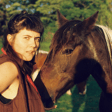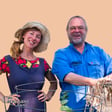
Big Bug Energy with Amelie Vanderstock
🌼 A spring equinox special 🌼
Meet Amelie Vanderstock – science communicator, artist, musician, native bee pHD and total ray of sunshine.
Amelie has a passion for pollinator-friendly cities, and raises awareness through workshops, collaborative art and obscenely catchy songs that celebrate weeds, bees and bin chickens.
This ain’t just an interview about invertebrates – though, there’s plenty of insectivorous inspiration to be had – nay, it has a solid backbone of advice and solidarity for all those trying to merge their strange passions and professional skills, who are yearning for greater alignment and intentionality in everything, from study to travel to morning routines.
Amelie also has a crowdfunding campaign to support the release of her debut album Let’s Bee Scientists and the resource kit that goes with it, turning ecological knowledge into ear worms for the next generation of earth lovers. It’s extremely close to reaching its target! You can pre-buy the album which will expedite its release and help Amelie do more of her sweet work.
🧙♀️ LINKY POOS
Pre-buy Amelie Ecology’s album



















